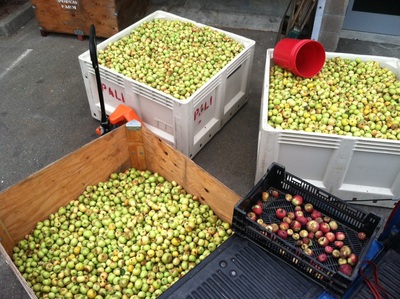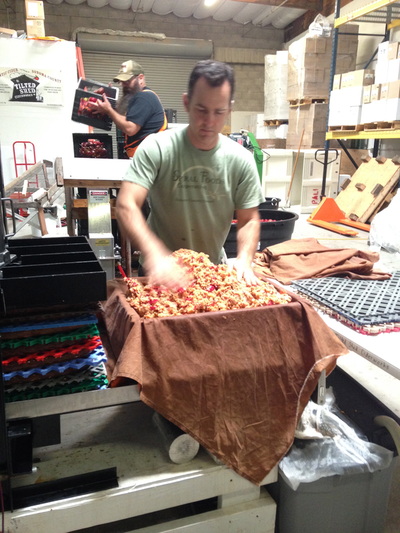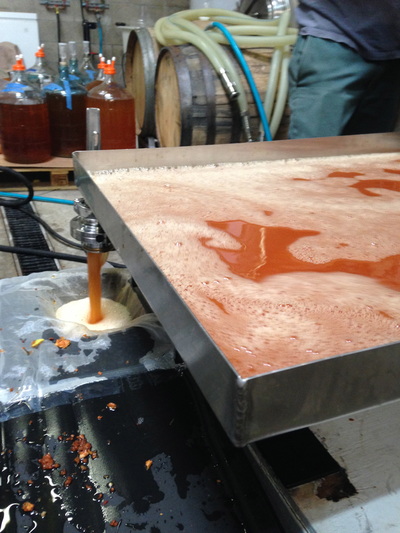|
It’s another pressing day. We have about 2 tons of apples to go through today. Scott’s hands seem permanently stained from the juice, he’s got scratches all over them from the press racks, and the long hours picking up bucket after bucket of pomace leave him with aches and pains. He’ll put in 10 to 12 hours today, and if he’s lucky, he’ll be home in time to hang out with our son for a little while before bedtime.
Why do we go through all this trouble? As far as I know, only a minority of commercial cider producers presses all locally grown apples on-site. Many outsource the pressing to processors, or buy out-of-season cold-storage apples, bulk juice, or concentrate, often from Washington state or China. It’s efficient and fast and probably more cost-effective. And besides, the results are the same, aren’t they? Clearly we don’t think so, or we’d take the easier route as well. We press all our apples because when your devotion to your craft borders on the fanatical (as our does), you are compelled to control the entire process. For us, that means we sort, wash, grind, and squeeze every apple that makes its way into our ciders. Despite all the work, the advantages of pressing are many. We ensure that only good-quality apples make the cut. We know exactly how much of which varieties we’re pressing, and who grew them, and how and where they were grown. We know what the apples taste like before they hit the grinder. We know their acidity and sugar levels intimately. Did you know that the Brix on one side of an apple can be up to 3 degrees higher than the Brix on another side? We press when the apples are at their peak. We don’t have to leave our apples sitting in a warehouse for days or weeks on end, until there is enough harvest to meet the processor’s tonnage requirement and a spot can be reserved on the processor’s schedule. We don’t have to rely on juice or concentrate arriving in tanker trucks or drums, from apples of questionable quality, who knows how old, grown who knows how, who knows where. We are able to do small batches by variety, and even by individual orchard, which is particularly exciting with the rare tannic cider apples. I’m talking batches as low as 5 to 15 gallons. You can’t do that when you have a 10-ton minimum processing requirement. Not when you have, say, only 200 pounds of locally grown Foxwhelp, 300 pounds of Kingston Black, 800 pounds of Muscat de Bernay, or even a whopping 1900 pounds of Nehou. Have you ever tasted a single-variety Sonoma County-grown Tremlett’s Bitter cider? It’s incredible how it changes over time. I can’t imagine us making cider without having that kind of experience. You can buy tannic cider-apple juice in bulk and concentrate. But it would be from apples grown far afield, possibly as far as Europe. Just as with wine, what makes cider so special is how the fruit varies by region. Terroir isn’t a marketing gimmick. It’s real. Our local climate has been perfect for growing apples with the profiles we look for in good cider. The fog, the soil, and the long, dry growing season, coupled with dry farming and minimal fertility, make for fantastic fruit. The tannin levels are off the charts. The sugars are fully developed. And the acidity is just right. The drought is awful, but it may result in us having our highest-quality harvest yet. Scott is able to blend these small batches following the long, slow fermentations to create the ciders we envision. We have a liberating amount of flexibility. And we are able to craft—and I mean “craft” in its dictionary meaning, to skillfully make something by hand—ciders that reflect a sense of place and our principles, that are a pleasure both to drink and to contemplate. Now granted, we don’t grow all our apples. We’ve got our hands full with the cidermaking and our own small cider orchard. But the apple growers around here have been having a hell of a time for the past 30 years. We consider it our civic duty to buy from them, and our environmental responsibility to support organic agriculture. And yay, this harvest we’re not hauling all the apples in bulb crates! I know it may seem charming, but it is a pain in the back. We have upgraded some equipment: forklift! bin dumper! apple washer! And when we can afford it, we’ll upgrade our press as well, because a modified shop press with homemade racks works great, but it sure takes its toll on Scott. We’re not getting any younger, and never is that more apparent than during harvest season. We’re willing to sacrifice a lot for cider, but we draw the line at our bodies. And, of course, our souls.
3 Comments
Eric
8/29/2014 02:20:02 pm
When you guys do get a new press I would love to buy that modified shop press how could I go wrong given it's history :)
Reply
9/2/2014 10:09:29 am
Congratulations on successful harvest and pressing this drought year. I'm sure you'll make some distinctive and tasty cider!
Reply
Thankyou for this Ellen - it's good I found it tonight, and not back in August when you wrote it - we do all our pressing as well, and sometimes I question the economics and sanity of doing so on our little rack and cloth setup. But really, given the choice - I wouldn't have it any other way, and hope our ciders speak to that difference. -Missy
Reply
Leave a Reply. |
EllenTilted Shed co-owner, cider evangelist & shameless rabble rouser! Archives
February 2021
Categories
All
|
|
|
All materials copyright Fireball Farm & Ciders, LLC. 2011-2024. All rights reserved. All product names are trademarks or registered trademarks of Fireball Farm & Ciders, LLC. Tilted Shed Ciderworks is a registered trademark.
Home page photo by Karen Pavone Photography. We respectfully acknowledge that our orchard and those of our farmers are on the unceded lands of the Coast Miwok, Southern Pomo, and Graton Rancheria peoples. We sell alcohol. You must be 21+. This website uses cookies to improve your experience. Accessibility: We are committed to providing a fully accessible and optimized user experience for all site visitors, regardless of vision or other impairments. Should you experience any difficulty in accessing this website, please call 707-657-7796 or email info at tiltedshed dot com during normal business hours for assistance with this website. |




 RSS Feed
RSS Feed